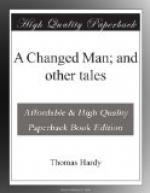I
An evident commotion was agitating the premises, which jerked busy sounds across the front plot, resembling those of a disturbed hive. If a member of the household appeared at the door it was with a countenance of abstraction and concern.
Evening began to bend over the scene; and the other inhabitants of the hamlet came out to draw water, their common well being in the public road opposite the garden and house of the Paddocks. Having wound up their bucketsfull respectively they lingered, and spoke significantly together. From their words any casual listener might have gathered information of what had occurred.
The woodman who lived nearest the site of the story told most of the tale. Selina, the daughter of the Paddocks opposite, had been surprised that afternoon by receiving a letter from her once intended husband, then a corporal, but now a sergeant-major of dragoons, whom she had hitherto supposed to be one of the slain in the Battle of the Alma two or three years before.
’She picked up wi’en against her father’s wish, as we know, and before he got his stripes,’ their informant continued. ’Not but that the man was as hearty a feller as you’d meet this side o’ London. But Jacob, you see, wished her to do better, and one can understand it. However, she was determined to stick to him at that time; and for what happened she was not much to blame, so near as they were to matrimony when the war broke out and spoiled all.’
‘Even the very pig had been killed for the wedding,’ said a woman, ’and the barrel o’ beer ordered in. O, the man meant honourable enough. But to be off in two days to fight in a foreign country—’twas natural of her father to say they should wait till he got back.’
‘And he never came,’ murmured one in the shade.
’The war ended but her man never turned up again. She was not sure he was killed, but was too proud, or too timid, to go and hunt for him.’
’One reason why her father forgave her when he found out how matters stood was, as he said plain at the time, that he liked the man, and could see that he meant to act straight. So the old folks made the best of what they couldn’t mend, and kept her there with ’em, when some wouldn’t. Time has proved seemingly that he did mean to act straight, now that he has writ to her that he’s coming. She’d have stuck to him all through the time, ‘tis my belief; if t’other hadn’t come along.’
‘At the time of the courtship,’ resumed the woodman, ’the regiment was quartered in Casterbridge Barracks, and he and she got acquainted by his calling to buy a penn’orth of rathe-ripes off that tree yonder in her father’s orchard—though ’twas said he seed her over hedge as well as the apples. He declared ’twas a kind of apple he much fancied; and he called for a penn’orth every day till the tree was cleared. It ended in his calling for her.’




